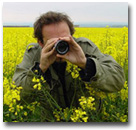Peau d’ange was filmed around
Angers. Do you have any connection with this
area? It’s an
area I’m familiar with. I felt something very strong there, even perhaps mystical. And then Anjou is also an area somewhat far from
the world. It’s rural, a place that’s withdrawn from town life. It goes without
saying that the countryside there is beautiful and its proximity to Paris obviously
facilitated the movement of the filming team. The colors of the whole film are very
soft, almost pastel. Why?
You took the camera sometimes? Yes, I did
approximately seventy percent of the film, something I had never done before. I held the
camera in the sequences at the farm and the sleeping children. I did not film the prison scenes. In fact, I
filmed whenever I wanted to. Angele is a girl who comes from a poor family in the countryside. Is there also a sense of innocence in that? No,
innocence and poverty do not have anything to do with the other. The problem of poverty as in Angele’s family
is very current in the rural areas. There are
people who sold their land and only have their kitchen gardens. In taking this location, I noticed that many people
lived that way as soon as one leaves the cities a bit. The
attitude of many towns people is not to realize that this is the way of life for many
people. It is enough to fly over by helicopter to realize what happens to the farms. I
come from the Swiss countryside. I passed from one
world to the other. My father started with a
factory and gradually we succeeded in gaining a certain comfort, not one you would call
“easy” but comfortable. In the first ten years of my life, I was friendly with a
boy whose father was a peasant on a large and beautiful farm, but that was not the
situation for everyone. There is a real crisis in agriculture. Is the relationship between the social classes a subject
which particularly interests you? Yes, it’s something which has always fascinated me. That also brings up questions of integration, which also interests me very much. Getting back to Angele, her naivety and poverty are not connected. She is not na´ve because she is poor. On the other hand, she is somebody who grew up isolated from the world, on a farm which resembles a place that could have existed at the beginning of the last century. The people there do not have television, and when it arrives in the small borough, they have already lost a little. Then there
is Bresson's Mouchette, which spoke to me while writing during a certain Did
Morgane More immediately embrace the role of Angele or did that take a certain time? I had proposed a kind of preparation for the role, and she did it with a coach, body exercises, dance and other forms of expression, in order to release her spirit. At the beginning of the film, I found that she reflected too much. She was playing the role with much introversion. It took time to find the tone of her character. You took acting classes classes with Patrice Chereau at Nanterre. What memories do you have? I knew Patrice Chereau at Nanterre. At that time one did theatre and cinema together. I made three films with him. That was very significant for my career. He was a master. He made me discover the universe, aesthetics in particular. Is your cinema family in France more than in the United States? It is true
that I've traveled, but I return to France because I miss it. For twenty years I have
worked in France. I like to work in the United States even though I have been a little
disappointed in the roles that have been offered to me and in those that are proposed to
me today. One must adopt a stereotype. In France I find roles that suit me better. As a
director, it would be different. Making Fanfan la tulipe is significant for me.
It is a role which I can really exist in. It interests me like my role in Le Bossu.
|
